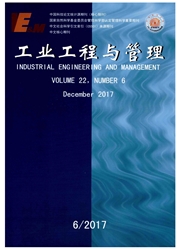

 中文摘要:
中文摘要:
针对飞机总装移动装配线的资源水平问题,以最小化资源成本为目标,提出并建立了具有空间约束的资源水平问题的数学模型。针对问题特点,提出了非关键任务调度优先级规则,并以遗传算法为框架,优化非关键任务调度优先级。在解码中,提出利用区间细分的方式来确定非关键任务位置,以提高计算效率,提出并设计了当前任务调度对全局资源水平影响的评估公式,极大提高了未调度任务在后续调度过程中选择更佳调度位置的几率。针对空间约束,构建了包含当前关键任务的局部调整方法。最后通过数据实验验证了算法的有效性和优越性。
 英文摘要:
英文摘要:
In order to solve the resource leveling problem for aircraft moving assembly line, anoptimization mathematical model with the objective function of minimizing the resource cost wasdeveloped considering space constraints. Based on the characteristics of the problem discussed inthis paper, the priority rules and genetic algorithm were proposed to optimize the priority of non-critical activities. To enhance the computational efficiency,the decision interval of the start time ofan unassigned activity was divided into multiple parts and only the part which the optimum wasmore likely belongs to would have a further review. A function which evaluates the effect ofcurrent activity scheduling on global resource level was presented to increase the possibility that abetter position could be chosen by an unassigned activity. A local adjustment method movingcritical activities and non-critical activities to meet space constraints was also presented. Thenumerical experiments were conducted and the results show the validity and efficiency of theproposed model and algorithm.
 同期刊论文项目
同期刊论文项目
 同项目期刊论文
同项目期刊论文
 A hybrid genetic algorithm for non-permutation flow shop scheduling problems with unavailability con
A hybrid genetic algorithm for non-permutation flow shop scheduling problems with unavailability con 期刊信息
期刊信息
